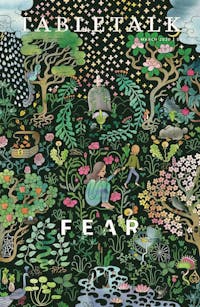
Request your free, three-month trial to Tabletalk magazine. You’ll receive the print issue monthly and gain immediate digital access to decades of archives. This trial is risk-free. No credit card required.
Try Tabletalk NowAlready receive Tabletalk magazine every month?
Verify your email address to gain unlimited access.
Consider how much of your life revolves around your financial stability. You awoke in a warm bedroom because you paid the electric bill. You had breakfast because you bought groceries. You commuted to work because you paid for a train ticket or gas for your car. You wore store-bought clothes appropriate for your vocation. Your job provides a regular income that pays for that heat, food, transportation, and clothing. And that’s just the tip of the iceberg. Almost everything your hands touched today has dollar signs associated with it.
Given the extent to which the basic necessities of life are connected with financial solvency, it’s no wonder that even Christians may struggle with the fear of financial loss. In a fallen world, even those who work and budget diligently sometimes find their expenses exceeding their income. Extended illness wipes out savings. Stock market crashes obliterate retirement accounts. Job layoffs occur in the prime of life. Bankruptcy threatens. Hunger and homelessness are not isolated problems. The transience of financial security is part of the reality of living in a sin-cursed and suffering-saturated world (Prov. 23:4–5; 1 Tim. 6:7).
It’s appropriate to be concerned about this, but often our lives manifest sinful responses and strategies to ward off the possibility of financial ruin. Our anxiety skyrockets. We become workaholics. We hoard our money, fearful that it will never be enough (Luke 12:13–21). We become stingy and calculating, treating every decision and relationship as if it were a financial balance sheet. Generosity dries up. And still, the specter of loss remains. How, then, do we face this possibility with a growing confidence in God rather than a growing anxiety?
It is critical that we understand and trust that God is a loving, generous Father who cares for His children and provides what is most needful for us. In the context of a discussion on covetousness and possessions, Jesus says to His disciples, “Therefore I tell you, do not be anxious about your life, what you will eat, nor about your body, what you will put on” (Luke 12:22). What gives us confidence to turn from our anxieties about potential financial loss? The verses that follow (22–34) highlight four things.
1. Life is more than the fulfillment of temporal needs (v. 23).
As important as food and clothing are (and by implication, the financial resources that enable their purchase), there is something even more critical for abundant life. In contrast to those who “seek after these things” as ends in themselves, Jesus urges His disciples to seek His kingdom first (v. 31; see Matt. 6:33). Living by this kingdom priority is what allows the Apostle Paul to say: “We do not lose heart. Though our outer self is wasting away, our inner self is being renewed day by day” (2 Cor. 4:16).
2. God provides for even the least of His creatures (Luke 12:24–28).
If He feeds the ravens and clothes the lilies with beauty, will He not provide for human beings who are the pinnacle of His creation? He knows what we need (v. 30). He will not give us a stone if we ask for bread (Matt. 7:9).

3. We are part of God’s flock (Luke 12:32). We are in community with our brothers and sisters in Christ.
Trusting God’s provision includes believing that He will bring people to our aid as we ask for help in a time of financial crisis. Paul’s collection for the church in Jerusalem demonstrates this interdependence in Christ’s body (2 Cor. 8–9).
4. Our Father delights to give us the kingdom (Luke 12:32).
If He has given us the greatest possession of all—an inheritance that is “imperishable, undefiled, and unfading” (1 Peter 1:4), how will He not also graciously give us what we truly need (Rom. 8:32)? Lasting wealth and true security are found in the kingdom: “For you know the grace of our Lord Jesus Christ, that though he was rich, yet for your sake he became poor, so that you by his poverty might become rich” (2 Cor. 8:9).
A growing trust in our faithful God doesn’t guarantee immunity from financial loss. However, despite the real threat of moneybags that grow old, earthly treasures that fail, thieves who break in and steal, and moths that devour (Luke 12:33), God’s people will never ultimately lack Jesus Christ. He is our bread of life (John 6:35) and our living water (4:14), and He clothes us with His righteousness (Isa. 61:10; Zech. 3:1–5; 2 Cor. 5:21; Phil. 3:9). He is our truest and deepest possession amid the shifting fortunes of life. Truly, He is Jehovah-Jireh, our provider (Gen. 22:14).
